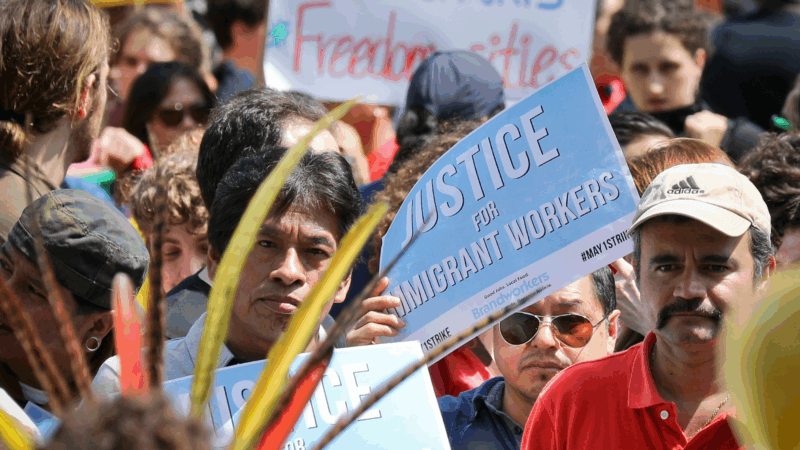May Day protesters will rally nationwide against the ‘war on working people’
Tens of thousands of protesters are expected to take to the streets nationwide on Thursday in May Day rallies opposing the Trump administration.
May Day, celebrated by workers across the globe as International Labor Day, occurs on May 1 each year. This year, activists in the U.S. aim to build on the momentum of recent widespread grassroots protests against policies implemented by the Trump administration.
Anti-Trump protesters have expressed a range of concerns regarding the administration’s recent actions, including the elimination of thousands of federal jobs, immigration raids, and billionaire Elon Musk’s involvement in downsizing the U.S. government.
A protest against the Trump administration’s ‘war on working people’
On May Day, protesters are honing their message to decry what they say are attacks on the working class and immigrants. Organizers for the effort, called May Day Strong, say the administration and its billionaire allies pose a threat to labor rights, public services, and the safety of immigrants regardless of their legal status. Organizers have stated their opposition to violent forms of protest.
“This is a war on working people,” organizers said on the May Day Strong events web page.
“They’re defunding our schools, privatizing public services, attacking unions, and targeting immigrant families with fear and violence,” they added. “We are reclaiming our power from corporate elites, and we will not be intimidated by Trump, Musk, or their billionaire backers. They’ve ruled for too long.”
The White House did not immediately respond to NPR’s request for comment.
The U.S. does not officially observe the labor holiday, due to what historians say is an enduring resistance to working-class unity. Despite that resistance, America’s working class has found ways to commemorate May Day since the 19th century.
The tradition began with a labor strike.
Why Americans protest on May 1
Before the 8-hour workday became standard, the organization now known as the American Federation of Labor planned a nationwide strike for May 1, 1886, to demand an 8-hour workday, as many workers were doing shifts twice that long.
The Chicago strike, known as the Haymarket Affair, turned violent when police clashed with civilians, and a bomb exploded. Although the bomb’s intended target was unclear, four men connected to the protests were hanged for conspiracy to commit murder and became celebrated as the Haymarket Martyrs. The Pullman railroad strike also played a significant role in establishing May Day in the U.S. Workers from the Pullman Palace Car Company initiated a widespread work stoppage in May of 1894, prompting President Grover Cleveland to send federal troops to Chicago to break the strike.
This set the stage for the long history of co-opting May Day.
Inspired by the Chicago workers, the international socialist movement gained traction, with activists spreading Marxist literature. In an effort to to detach May Day from labor movements, U.S. presidents have tried to redefine its significance. President Dwight D. Eisenhower made May 1 as “Law Day” — to recognize how the rule of law protects civil liberties, and Labor Day was moved to September.
During his first term, Trump echoed his predecessors by declaring May 1 “Loyalty Day,” a time to celebrate the country’s loyalty to individual liberties. Previous May Days during Trump’s presidency saw similar protests and boycotts by immigrants and workers who railed against the Republicans’ border wall plans and mass deportations efforts.
But the protests held across the U.S. in 2006, triggered by a bill to increase penalties for illegal immigration, might serve as a better comparison. Those March protests saw some 2 million demonstrators rally in 140 cities and 39 states.
What distinguishes Thursday’s planned May Day protests is the scale of the movement, said Joseph McCartin, professor of labor history at Georgetown University.
With more than 1,000 events planned for May 1 in over 1,000 cities, according to organizers, McCartin said the nationwide protests stand to become the world’s most widespread May Day on record.
“These are going to be protests that bring out a broader array of people and a broader array of places, and I think that’s going to be historic, at least for that reason,” he said.
‘Dawson’s Creek’ star James Van Der Beek has died at 48
Van Der Beek played Dawson Leery on the hit show Dawson's Creek. He announced his colon cancer diagnosis in 2024.
A Jan. 6 rioter pardoned by Trump was convicted of sexually abusing children
A handyman from Florida who received a pardon from President Trump for storming the U.S. Capitol on Jan. 6, 2021, was convicted on state charges of child sex abuse and exposing himself to a child.
A country-pop newcomer’s debut is your reinvention album of 2026
August Ponthier's Everywhere Isn't Texas is as much a fully realized introduction as a complete revival. Its an existential debut that asks: How, exactly, does the artist fit in here?
U.S. unexpectedly adds 130,000 jobs in January after a weak 2025
U.S. employers added 130,000 jobs in January as the unemployment rate dipped to 4.3% from 4.4% in December. Annual revisions show that job growth last year was far weaker than initially reported.
Greetings from Mexico City’s iconic boulevard, where a dog on a bike steals the show
Every week, more than 100,000 people ride bikes, skates and rollerblades past some of the best-known parts of Mexico's capital. And sometimes their dogs join them too.
February may be short on days — but it boasts a long list of new books
The shortest month of the year is packed with highly anticipated new releases, including books from Michael Pollan, Tayari Jones and the late Nobel laureate Mario Vargas Llosa.






